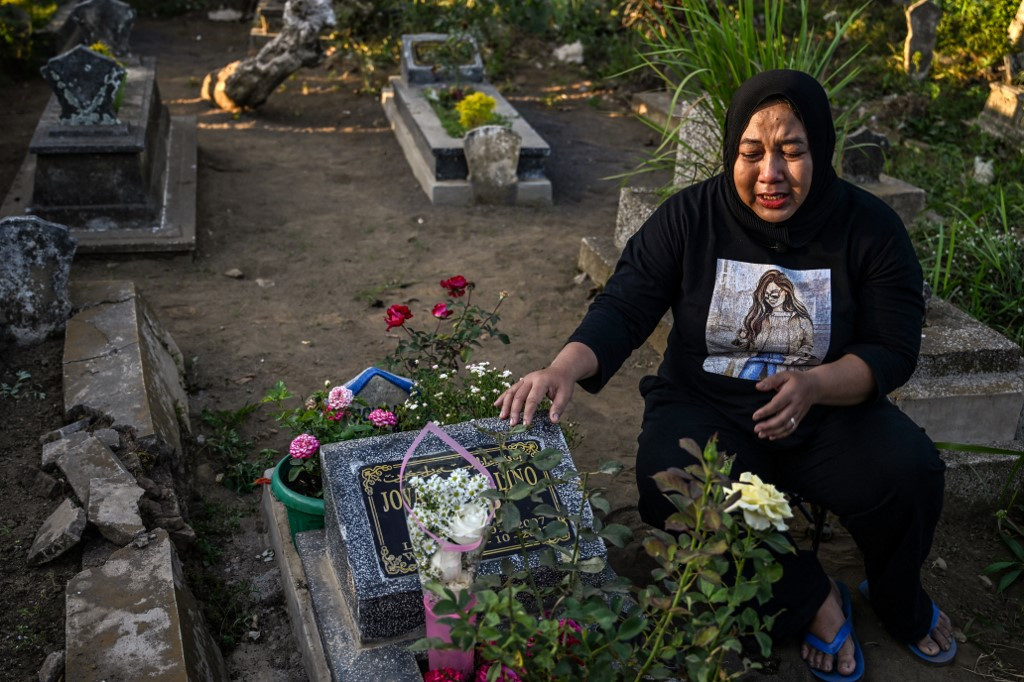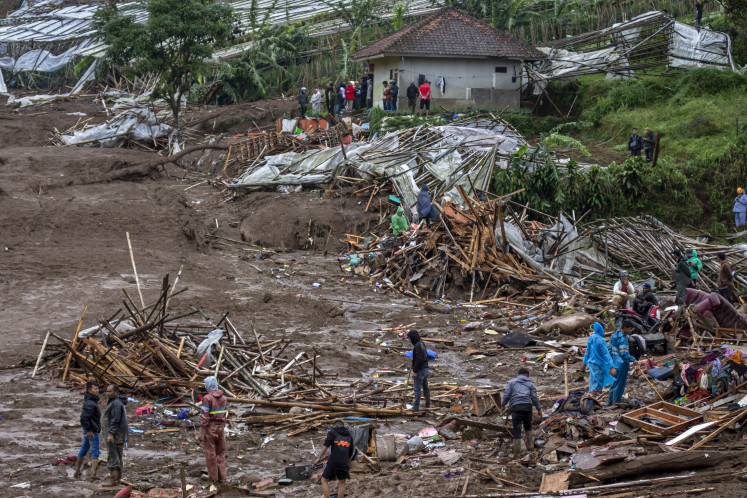Popular Reads
Top Results
Can't find what you're looking for?
View all search resultsPopular Reads
Top Results
Can't find what you're looking for?
View all search resultsFamilies face grief, intimidation year after Kanjuruhan stadium crush
Fifteen-year-old Jovan Farellino was one of 135 people killed after a match in Malang, East Java with many dying from suffocation or being trampled in one of the deadliest disasters in the sport's history.
Change text size
Gift Premium Articles
to Anyone
 This picture taken on Sept. 21, 2023 shows Cholifatul Nur reacting as she sits beside the grave of her only child Jovan Farellino, who was 15 when he died in the stampede that killed 135 people at the Kanjuruhan football stadium on October 1, 2022, in Malang, East Java. Fifteen-year-old Jovan Farellino was one of dozens of children killed after a match in the East Javan city of Malang that left 135 people dead, many from suffocation or trampling, in one of the worst tragedies in the sport's history. (AFP/Juni Kriswanto)
This picture taken on Sept. 21, 2023 shows Cholifatul Nur reacting as she sits beside the grave of her only child Jovan Farellino, who was 15 when he died in the stampede that killed 135 people at the Kanjuruhan football stadium on October 1, 2022, in Malang, East Java. Fifteen-year-old Jovan Farellino was one of dozens of children killed after a match in the East Javan city of Malang that left 135 people dead, many from suffocation or trampling, in one of the worst tragedies in the sport's history. (AFP/Juni Kriswanto)
H
olding buckets of water, Cholifatul Nur sprinkles flowers planted at her young son's grave and wipes clean the stone slab where a scarf of his favourite team is draped a year after his death at an Indonesian football stadium.
Fifteen-year-old Jovan Farellino was one of 135 people killed after a match in Malang, East Java with many dying from suffocation or being trampled in one of the deadliest disasters in the sport's history.
Wearing all black, Nur speaks of the grief and intimidation she has faced in her fight for justice alongside other relatives of the dead. They blame police who fired tear gas into stands packed with Arema FC fans, causing a panicked rush for small exits.
"Jovan was everything for me. He was my only child," she told AFP.
She rushed to the stadium just before midnight after hearing about the unfolding tragedy, knowing her son had attended, only the third time he had done so.
When she arrived, she found his lifeless body at the VIP gate where his friends had moved him.
"Suddenly he perished in that way. I can't accept that," she said.
The tear gas shot into stands after a post-match pitch invasion was deemed the official cause of the deaths, but families say authorities have not been held appropriately responsible for their actions at Kanjuruhan Stadium.
Several prison sentences have been handed to three police officers for negligence, ranging from one to two-and-a-half years.
Two of them were acquitted earlier this year, to families' dismay, but the Supreme Court has since overturned that decision.
A judge also earlier ruled police had not shot tear gas into stands -- rather it was carried by the wind. But that account was disputed by witnesses and challenged by video footage. FIFA, football's world governing body, bans the use of tear gas in stadiums.
Seven families, including Nur's, pursued legal action seeking compensation of around Rp 62 billion ($4 million), according to Imam Hidayat, a lawyer representing them. But a local court rejected that bid.
'Life for a life'
The tragedy stoked the ire of Indonesians against the country's police, who critics have long accused of using excessive violence to quell unrest as well as intimidation to silence detractors.
After criticising authorities during police questioning, Nur says men in black clothing nearly hit her on a motorbike. She also caught people taking photographs of her home.
Nur says police officers even told her they could help her nephew join the force.
"I don't want that. The child I lost came from my own womb," she told AFP.
"I want the death sentence (for the officers). It's fair, a life for a life."
Rini Hanifah lost her 20-year-old son, Agus Riansyah, in the stadium crush after he had asked for her permission to attend the match.
She allowed Agus to go but refused to let him take two younger siblings because, even with away fans banned, it was a heated derby against fierce rivals Persebaya Surabaya.
The mother, who says she is seeing a psychiatrist to deal with the grief, claims she was also offered the opportunity for her other children to join the police force.
"They told me if my children wanted to become police officers, it would be easy," she said.
East Java police did not respond to an AFP request for comment.
Indonesian football association executive committee member Arya Sinulingga said officials have "made various changes, both reactive to events and proactive" including improved stadium safety measures.
But many believe the police have not, like Hanifah, who called police "scoundrels" and slammed the trial.
"It was a sham. It felt like a puppet show," she said.
"Please, restore our trust, so that we believe again that in Indonesia there is justice."
'Have to fight'
Survivors recounted the horrors they witnessed and the trauma they still face a year later.
Dayangga Sola Gratia, a 23-year-old water park worker in Malang, is on medication to help her deal with what she saw.
"Since then, I never look at football, I don't even look at notifications (about it). I immediately erase them," she said.
She feels anger towards the people she says have not been held accountable.
"Let them feel what we felt at the time. Let's swap," she said.
"After this (sentence) they are free, they can still gather with their family, but can those who were left behind?"
That rage mixed with grief has hardened relatives' resolve.
Families visited the country's criminal investigation department this week to lobby for a new probe, submitting a report that calls for officers to be charged with murder, premeditated murder and violence against children.
The maximum sentence for non-premeditated murder in Indonesia is 15 years in prison. Murder is punishable by death.
"We support the families' fight for justice," said Usman Hamid of Amnesty International Indonesia, adding no significant government measures have been taken to prevent a repeat disaster.
Back in Malang, Nur kisses a prayer book before leaving her son's grave, wipes away tears and makes him a promise that she will avenge his death.
"This is my child. I have to fight for him... I have to find justice, whatever's at stake," she said.
"If my life could be exchanged with justice, I want that."









